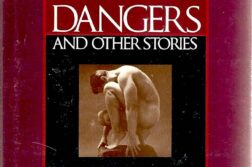Imagine the wilderness of 19th-century Oregon. Burly, broad-chested trapper men paddle canoes upstream exploring nature’s brute beauty, hunting, foraging, and sleeping under the sky. Sensuous noble savages that you encounter offer revelry, wisdom, peace, even medicine-visions. Imagine a world without time, only the arc of the sun and moon; without women, only lusty men lusting for other men, frolicking naked in the forest, splashing in fresh water, embracing, kissing, their cocks becoming engorged beneath loincloths that can’t contain them any longer, their hands and mouths exploring every possibility, all without a hint of inhibition.
This charming, delightfully queer pastoral, which was originally published in 1966, has been brought back by Little Sister’s Classics, a series of books created by Arsenal Pulp Press and the Vancouver bookstore Little Sister’s to revive gay and lesbian literary classics. Richard Amory’s Song of the Loon was a watershed in the history of gay literature and publishing, selling two million copies, spawning two sequels—Amory’s Song of Aaron and Listen, the Loon Sings—a parody novel called Fruit of the Loon, several pornographic flicks, and the first independently produced, non-pornographic gay male feature to be granted mainstream theatrical release. Not bad for a first novel written in secret by a one-time family man and schoolteacher from California.
Appearing within the first wave of the U.S. gay rights movement, Amory’s book sparked a revolution in the publication and distribution of gay-oriented literature by reformulating the standard “jackoff” novel. Striving for a psychological realism and an æsthetic of beauty while upholding a fantasy of homoerotic freedom, Amory confronted the realities of censorship, heterosexist editors, and low literary standards, that had hitherto permitted only closeted characters and little direct expression of same-sex desire. An outspoken advocate of freedom of the press and an unabashedly out writer whose mantra was “gay all the way,” Amory heralded the advent of a gay literary culture independent of heterosexual control or interference.
The opening paragraphs prepare the reader for Amory’s homosexual utopia. A picture of the high May sun streaming through Douglas firs, emerald waters, jays crying and streaking into the wood, cuts to a man, a paragon of strength, virility, rustic beauty. “Shirtless, his deeply-muscled shoulders stretched and tightened as he paddled, formed knots and hollows across his back. His chest hair gleamed with sweat, and the thin line of hair down his belly, widening below the navel, was flattened against his undulating muscles.” Behold, the heroic Ephraim MacIver, outdoorsman and lover of all men, white, native, old, and young. Ephraim is embarking on an erotic journey through the American wilderness, one that culminates in sexual enlightenment—ushering him into the elite men’s club, the “Society of the Loon.” And you too, Dear Reader, are invited to join. Leap to the challenge! Don your loincloth and explore, push outward! “Your penis lengthens—let it swing!”
Ian Mozdzen is co-creator of Out of Line Theatre, an emerging theatre company in Winnipeg.





